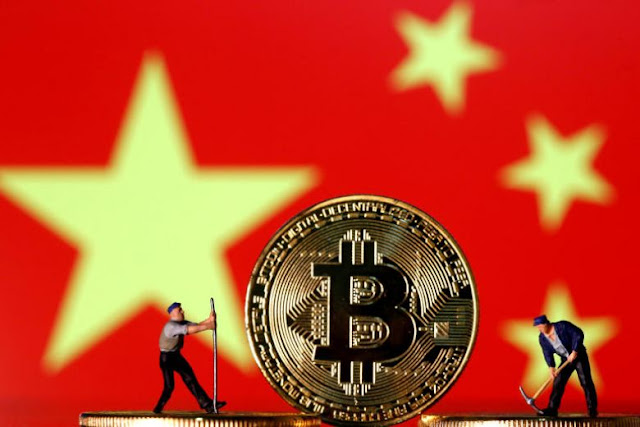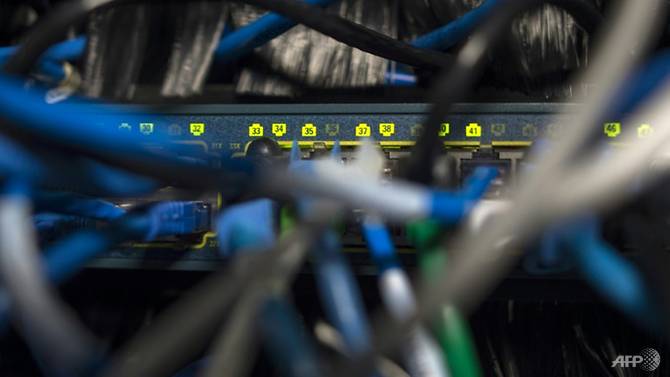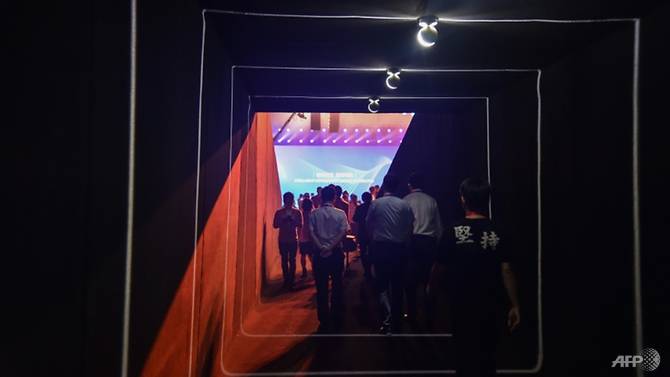https://youtu.be/Rd8gVeqE-qc
< https://youtu.be/h8pWZyLyS6U
https://youtu.be/TovXuxuyeK8
Has China surpassed USA in education?
https://youtu.be/FTndIELsh48
How China’s tech sector is challenging the world - Part 1
https://youtu.be/veEMMi9BCUE
Huawei CEO: "US companies will suffer the most"
https://youtu.be/MlZU3ktM95w
The Point: Does China need to teach the West lesson in 5G?
https://youtu.be/DTghfxg_DEE
< https://youtu.be/h8pWZyLyS6U
https://youtu.be/TovXuxuyeK8
Has China surpassed USA in education?
https://youtu.be/FTndIELsh48
How China’s tech sector is challenging the world - Part 1
https://youtu.be/veEMMi9BCUE
Huawei CEO: "US companies will suffer the most"
https://youtu.be/MlZU3ktM95w
The Point: Does China need to teach the West lesson in 5G?
https://youtu.be/DTghfxg_DEE
LIKE it or not, the Fourth Industrial Revolution (IR4.0) is upon us.
Sure, Tun Dr Mahathir Mohamad has shown political resolve in pointing Malaysians towards a new course in reaching higher levels of industrialisation. Lest we forget, IR4.0 simply embodies digitalisation. It’s powerful – where speed, sophistication and the profound impact of digital technologies are integrated into orthodox industries on a massive scale.
Frankly, I worry that – until now, as the process of digitalisation in Malaysia lags behind what’s happening around us – the lack of preparedness and of real resolve to act with clear plans and programmes will (unlike China) leave us further and further behind as domestic politics continue to overwhelm. Previous technological shifts followed the onset of the steam engine in the first industrial revolution; then came electricity, the internal combustion engine, the telephone and the light bulb which is the second; followed by the third which moved from analogue to digital (web 2.0) as reflected by the personal computer, networking, the Internet and data/IT.
Digitalisation
In the digital age, economic activity results from billions of online connections. They involve not just people and organisations, but also data, devices, systems and processes. Its backbone is hyper-connectivity. It’s where the effects of technologies and platforms (such as Internet, artificial intelligence (AI) robotics, 5G, computational biology, the Internet-of-Things or IoT, data analytics and computational analysis) give rise to whole new industries, creating significant massive shifts in productivity and jobs.
Outside Malaysia, the digital economy is taking shape and undermining conventional notions about how businesses and organisations are structured; how they interact; and how consumers get their information, goods and services. For example, mall car parking in China is done digitally – after scanning the car’s number plate, the car is directed to an empty lot; and when it leaves, the system automatically deducts the fee from the e-wallet. Simply, components in the digital economy are transformed or empowered by digitalisation: the fundamental process where data is generated, collected, analysed and eventually serves as the single most valuable asset. And so, data becomes the most valuable currency.
Today, China, Germany, the United Kingdom, South Korea and Japan lead the world in digitalisation – way ahead of the United States. China’s digital economy accounts for about one-third of its GDP: arising from two components (i) the orthodox ICT industry; and (ii) the digital empowerment of conventional industries (like agriculture, pharmaceutical, transportation, services, etc). This part contributes 75% of what’s digital.
Today, digital technologies have created a new virtual and autonomous economy (VAE) beyond mere production. Here, businesses & their processes make use of intelligent functions to boost economic activities – slowly but surely, they begin to render human activities increasingly obsolete.
The VAE is all about distribution – who gets what from production. This changes everything: from politics to free market beliefs to social structures. It all started in the ‘70s and ‘80s when ICs (tiny “integrated circuit” microchips) brought real computational assistance to the economy – arrival of the personal computer.
Then, the 1900s and 2000s brought in the connection of digital processes through the Internet; web services emerged, and the cloud enlarged computing resources. Everything started to talk to each other. Globalisation arrived. Since then (the 2010s), the onset of wireless networks through the use of a range of sensors brought into focus, data – using tons of data to enable machines to “see” via intelligent algorithms.
So, came computer vision (ability of machines to recognise), natural-language processing (ability of computers to “talk”), digital language translation, face and voice recognition, inductive inference and digital assistance. The use of masses of data to form “associations” began to give “life” to computers (beginning to act like humans), making them “intelligent.”
The new intelligent building blocks – using information, enable digitalisation to re-architect the way businesses do things. As a result, entirely new industries (never even thought of) will spring up.
Lost jobs
In 1930, Lord John Maynard Keynes predicted that by 2030, the use of robots will lead to “technological unemployment”. This is now a reality – 10 years ahead! Jobs get increasingly scarce.
The orthodox economy will have by now produced enough for all. In the new VAE, physical production matters less; access to what’s being produced becomes key – distribution, i.e. who gets what! The new distributive era brings new economic and social realities: (i) belief in free markets (which prize efficiency over distribution) will be under pressure, since losers are rarely fully compensated in practice; (ii) the way to measure growth will also change (since GDP and productivity are now measured in terms of physical production) so that virtual advances in value-added will be properly accounted; (iii) workers feel disenfranchised as digitalisation replaces many of them – creating a quiet anger about immigration, inequality and elitists.
5G
US dominated 4G mainly because regulators got out of the way of private risk-takers. This led to the coming of mobile wireless Internet. Europe and Asia are still smarting over the United States having beaten them to the 4G finish line. By 2016,4G added almost US$100bil annually to American economic output and created numerous wireless-related jobs. It also powered the rise of the “app economy” because tools like Uber, Airbnb, Netflix and Waze require superfast mobile speeds to work.
Most apps weren’t even envisioned a decade ago; now nearly three-quarters of the companies in the global app economy are American. Other countries know they will reap massive economic returns if they knock the US off its perch as the 5G economy unfolds. Indeed, Europe and Asia are poised to surge past the US when it comes to mobile Internet innovation.
The next generation mobile broadband or 5G will allow entrepreneurs to create new technologies and products that we don’t even yet know we need. Ten years ago, most consumers didn’t have a smart phone; now most can’t live without them.
All of this happened thanks to 4G. With 5G, mobile speeds could be 100 times faster. This could enable driverless cars to avoid accidents, transform medicine through implanted medical devices, and produce smarter cities and energy grids through the emerging IoT.
Countries that build their 5G networks first will be in a better position to experiment with and deploy tomorrow’s technologies. Their first-to-market advantage could displace Silicon Valley and other US tech cradles. Already the United States is very much behind compared with Europe, South Korea, Japan and China. Since 2015, China has built about 350,000 cell sites, against fewer than 30,000 in the United States. That’s a huge competitive disparity because 5G requires far more cell sites grouped closer together than 4G.
The robot is part of a broader trend in China, where techcos are teaming up with a variety of industries – agriculture, auto-mobile, healthcare – to explore the possibilities of combining 5G and AI to revolutionise traditional sectors.
From conducting the world’s first 5G-enabled surgery on a human and transmitting 8K ultra-high-definition TV content through 5G networks, to piloting self-driving buses and cars, China is pioneering cutting-edge technologies for commercial use. The high-tech push is expected to accelerate now that China just kicked off the 5G era at speeds at least 10 times faster than 4G. So it is possible to gather high-quality data quickly, which is necessary to ensure AI is effective. AI applications have existed before the commercial use of 5G. But it is the superfast speed, gigantic computing capacity and massive device connectivity of 5G that will spawn the use of AI in most sectors and on a far larger scale. 5G’s responsive speed can empower mission-critical applications that are impossible with 4G networks.
When a needle pinches your finger, it takes one-hundredth of a second to feel the pain. And theoretical latency of 5G is one-tenth of that. Only with such speed can remote surgeries and autonomous driving see wider applications. In March 2019, a patient with Parkinson’s disease underwent China’s (and possibly the world’s) first 5G-based remote surgery. Digital technologies such as AI, next-generation network security, robotics, blockchain, IoT, 3D printing and virtual reality all depend on data. 5G addresses this need for data collection with its quick, smooth transmission.
The most important use of AI is to allow machines to automatically make decisions. The best application is self-driving vehicles where 5G will allow decisions to be made more reliably. When a car runs into emergencies (like a pedestrian suddenly jaywalking), a delay in seconds of data transmission among sensors equipped within the car will likely cause a potentially grievous, even fatal, accident. 5G can prevent such things from happening.
6G
While 5G is set to have a revolutionary influence on society and industries, 6G will bring more dramatic changes with super high speeds and ultralow latency. Theoretically, downloads over 6G can reach the astonishing speed of 1 Tbit per second, one thousand times faster than 5G’s capability of 1Gbit. In the 6G era, in less than a second, a new movie can be transmitted from the Internet to computers or smartphones. But 6G will go way beyond entertainment. For many researchers, 6G is capable of addressing some of the shortfalls of 5G and enabling streamlined connections with super performance in speeds and latency – for instance, the IoT and augmented reality.
Beijing started preliminary work on 6G research at the end of 2017. China’s 6G concept research and development work will start in 2020, with an expected commercial release in 2030. In Europe, 6G moves will mainly come from Finland. As I see it, Europe and China will need to join hands to work on 6G: because (a) cooperation is of strategic importance for both. 6G will greatly improve applications under 5G. With larger bandwidth, much lower latency and wider connections, it can revolutionise the structure of wired and wireless networks.
New 6G technical solutions can include satellite communication technology. This means a large number of places that are not covered by communication signals (for instance, deep oceans where base stations cannot be built) will have the possibility of transmitting and receiving signals in the future; (b) such cooperation will help Europe cope with the risks of lagging behind; and (c) it would be a natural extension of their proven 5G cooperation.
What then are we to do
The 5G technology promises to be the backbone of tomorrow’s Internet, transforming virtually every industry, including weaponry and manufacturing, by offering seamless wireless connections up to 100 times faster than current 4G networks. Its speed and capacity enable innovations, such as driverless cars, robot-run factories and Internet-connected pacemakers. It is said often enough that we tend to overstate the impact of technology in the short run and understate it in the long run.
One of the widely misquoted statistics concerns an imminent job apocalypse: automation will slash 47% of US jobs by mid-2030. In truth, the real finding of the two Oxford dons simply concluded that occupations accounting for 47% of current American jobs (including those in office administration, sales and various service industries) fall into the “high risk” category.
No attempt was made to estimate how many jobs will actually be lost. Much depends on cost, regulatory concerns, political pressure and social resistance. Historically, new technologies have always ended up creating more jobs than they destroyed. In the long run, all should work out fine. The short term is likely to be bumpy.
Simply because new technologies take time to raise productivity and produce wage gains. But, one thing is certain, automation is likely to boost inequality in the short run. So, policymakers need to really manage the transition: making greater use of insurance to compensate workers who have to move to jobs with lower salary; reforming education systems and support retraining and lifelong learning; extending income tax credit to improve incentives to work and reduce inequality; removing regulations that hinder job-switching; providing “mobility vouchers” to subsidise relocation as the distribution of jobs changes; and changing zoning rules to allow more people to live in the cities where jobs are being created. Sure, all these make sense. But will policymakers pay attention? To be frank, governments are incredibly unprepared for what’s to come.
The bottom line? Power brings with it great responsibility. Those in the technology and AI space have a moral imperative to ensure the ethics of data and technology – especially to help policymakers navigate complex ethical issues involved in using AI and robotics.
Most data relate to people – hence, the need to understand human behaviour. Technologies provoke a whole raft of new ethical issues involving transparency and accountability of business processes and decision making. Then, there are issues of privacy and rights connected with personal data. Not to forget that machine-learning algorithms often introduce bias.
Resolving them requires an approach grounded in ethics and an understanding of the causes of bias – traditionally the province of philosophy and sociology. In the end, the challenge lies in formulating transparent rules and ethical standards that can be agreed by the large scientific and technology community. That’s always tough!
BY Tan Sri Lin See-Yan who is Research Professor at Sunway University. His new book: Trying Troubled Times Amid Trauma &Tumult, 2017–2019 (Pearson). Feedback is most welcome. The views expressed are the writer’s own.
 Related
Related Ordinary folk inspired top economist's book | The Star Online
Work in progress: Sultan Nazrin glancing through pages of the book with Prof Lin (right) as Cheah looks on at Sunway University.
Ordinary folk inspired top economist's book | The Star Onlinehttps://youtu.be/k3_OsdoLZCo























